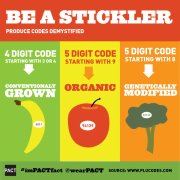Suppose you wanted a dog with a long, lean body and legs: would you search for a greyhound, or would you want one that was created in a lab with extra giraffe genes? If you like big juicy apples, do you choose red delicious type, or would you select one injected with watermelon DNA to make it bigger?
It hasn’t become that radical yet, but GMOs, AKA ‘genetically modified organisms,’ are already a part of the food supply. Foods that are grown naturally one way are injected with different genetic material to make them grow and change another way. Do you, a non-modified human being, want to continually injest foods or be exposed to products that have been altered to create a certain trait? And if you do, what proof do you have that it won’t negatively affect your health in the short-term or the long-term?
According to Dr. Edward F. Group III, there is profit for the manufacturers of the altered products and virtually NO protection on the books (laws or regulations) for consumers or the environmment:
“Collectively called recombinant DNA technology, this practice changes the core genetic make-up of organisms. This genetic manipulation gives scientists the ability to create any trait that they wish, or suppress natural traits they don’t want. There are several reasons this unnatural genetic manipulation may affect you.
- It’s usually not clear which consumables have been genetically manipulated.
- You don’t know the long term health effects of these genetically modified foods. Initial research has shown that short-term reactions can be severe.
- Agro-chemical companies and the government are planning to charge farmers fees to grow their GMO crops, thereby negatively affecting the economy and environment.
Cultivated Genetically Modified Foods
From bacteria (E. coli) and fungus, fruits and vegetables to animals, genetic manipulation is becoming more and more common in our society. In the US market now, 60-70% of the processed foods are genetically modified. In 2006, United States GMO crops reached just shy of 135 million acres, with the total global area exceeding 250 million acres!¹
This is a short list of the genetically modified food crops that are grown in the US today:
- Corn
- Soy bean
- Sugar cane
- Tomatoes
- Potatoes
- Sweet peppers
- Bananas
- Strawberries
- Zucchini
- Pineapples
- Cocoa beans
- Yellow squash
The illustration contains codes that differentiate organic, local and GMOs, use them as a guide while shopping and share the knowledge, it could mean life or death…..
- Whenever possible, eat all natural foods. Shop at your local farmers market for fresh foods which supports your local economy.
- Use only organically grown fruit and vegetables. Organic crops are grown using no genetic modification or toxic pesticides and herbicides.
- Your zucchini and yellow squash may be genetically modified too. Use only locally grown or organic produce.
- Be careful to eat only organic varieties of popcorn and corn. They are very often genetically modified.
- Start your own organic garden. Growing your own fruit and vegetables is one of the best things you can do for your family. Be sure your location is not in close proximity to plants, industry or bioengineered farms.
- When you’re shopping for meat and dairy products, be sure to look for the hormone and antibiotic-free, organic, range fed information on the label.
- Avoid canola oil and cottonseed oil. Use instead, organic sources of grape seed oil, virgin coconut oil, hempseed oil and olive oil which are available at organic and whole foods markets.
- Check your condiments for organic labels. You can find organic fermented sources for soy like natto (fermented soybeans), tempeh, miso, tamari, and tofu.
- Aspartame is genetically modified and is very toxic, it’s best to avoid all products that contain this substance.
- Take action. Write your council members and grocery executives. Let them know that you want fresh foods in your stores. Ask them to stock organic and no GMO foods.
http://www.nongmoshoppingguide.com/
Visit www.TrueFoodNow.org/shoppers-guide for the extensive list of foods and brand names that contain GMOs






